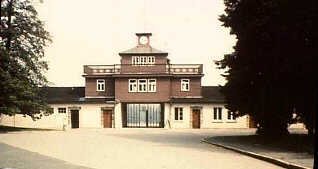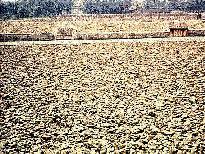

 In any presentation about Germany, we have to go back to WWII and to the Holocaust. No serious discussion about today's Germany can avoid this moment, this low point of human history, and the ghastly years that preceded it. For the Germans, the end of the war meant total defeat, not only militarily, and physically, with their cities and their economy in ruins, but morally. They had incurred a guilt that they now must bear for generations.
In any presentation about Germany, we have to go back to WWII and to the Holocaust. No serious discussion about today's Germany can avoid this moment, this low point of human history, and the ghastly years that preceded it. For the Germans, the end of the war meant total defeat, not only militarily, and physically, with their cities and their economy in ruins, but morally. They had incurred a guilt that they now must bear for generations.
 If we listen to the story of Holocaust survivors, every testimony of suffering from this period seems to occupy a holy space. Always these stories begin with the reduction of the person involved to a sub-human level, with the stripping of all dignity, their demise immanent. A few lucky ones survived and continue to live unto this day.
If we listen to the story of Holocaust survivors, every testimony of suffering from this period seems to occupy a holy space. Always these stories begin with the reduction of the person involved to a sub-human level, with the stripping of all dignity, their demise immanent. A few lucky ones survived and continue to live unto this day.

The word "dignity," - in German, Würde, worth, worthiness, is key to the rest of this presentation. This abysmal period seems for the Germans, with all their wealth and success, impossible to surmount. In it is hard to conceive of a nation sinking lower. Even subsequent genocides in Africa and Asia, or our own mis-adventure in Vietnam, do not compare to the Nazi effort in terms of systematic organization, thoroughness and brutality.
 The Germans have tried, and continue to grapple with the problem of their past. Nowhere does the thinking on the subject go deeper. This struggle for consciousness on their part is not often appreciated or even recognized. Other nations, not as involved but also complicitous in the expulsion and deportation of the Jews also have difficulty facing up to the anti-Semitic trends in their past: - France for instance,or Poland, or Russia.
The Germans have tried, and continue to grapple with the problem of their past. Nowhere does the thinking on the subject go deeper. This struggle for consciousness on their part is not often appreciated or even recognized. Other nations, not as involved but also complicitous in the expulsion and deportation of the Jews also have difficulty facing up to the anti-Semitic trends in their past: - France for instance,or Poland, or Russia.
 Buchenwald is such a troubling place. This was my second visit,and I must say, it got to me...I had to spend the afternoon alone. I could not speak, didn't want to hear any one else speaking either. The dead are there in such numbers, silent in scores of tongues. No living person can grasp the suffering. The hundreds of stories of the survivors that I have heard and read only serve to make me wonder about the millions of untold stories. Silence seems to me the only appropriate response.
Buchenwald is such a troubling place. This was my second visit,and I must say, it got to me...I had to spend the afternoon alone. I could not speak, didn't want to hear any one else speaking either. The dead are there in such numbers, silent in scores of tongues. No living person can grasp the suffering. The hundreds of stories of the survivors that I have heard and read only serve to make me wonder about the millions of untold stories. Silence seems to me the only appropriate response.
The killing did not stop with the Nazi's. Our guide,a Russian woman, told us that she was continually having to workup new versions of her tour lecture. After the opening up of East Germany, it was discovered that the Soviets housed prisoners there as well, and even executed thousands more,and buried them in mass graves.
And the trouble continues. In the news in August (1994), there were reports of Skinheads creating scenes there, clashing with the police, who were uncertain and irresolute in their approach. The past is always there,the dead are still there bearing silent witness. The past is always part of every serious conversation in Germany. It never fades from public awareness.
 Recently records in Poland were unearthed and gave rise to a controversy that caught Germany's attention this past summer, a throwback to the more rigid days of the Cold War. Since 1960, Marcel Reich-Ranicki, who is now 74, has been one of the best-known literary critics writing for a general audience. His reviews appeared regularly in Die Zeit (1960-1973); he was literary editor of the Frankfurter Allgemeine Zeitung from 1973 to 1988 and still writes regularly for that paper. For the past six years he has been a commentator on the television showLiterarisches Quartett. He has a shelf of books to his credit along with numerous awards and honors. Late this spring, the news weekly Der Spiegelpublished an interview with a onetime double agent, a Pole, who accused Reich-Ranicki of having served as a high-ranking official in the Polish intelligence services in the late 1940s.
Recently records in Poland were unearthed and gave rise to a controversy that caught Germany's attention this past summer, a throwback to the more rigid days of the Cold War. Since 1960, Marcel Reich-Ranicki, who is now 74, has been one of the best-known literary critics writing for a general audience. His reviews appeared regularly in Die Zeit (1960-1973); he was literary editor of the Frankfurter Allgemeine Zeitung from 1973 to 1988 and still writes regularly for that paper. For the past six years he has been a commentator on the television showLiterarisches Quartett. He has a shelf of books to his credit along with numerous awards and honors. Late this spring, the news weekly Der Spiegelpublished an interview with a onetime double agent, a Pole, who accused Reich-Ranicki of having served as a high-ranking official in the Polish intelligence services in the late 1940s.Raised in Berlin, Reich-Ranicki came from a Jewish family of mixed German-Polish origins. During the war, the family was deported to Poland. He managed to escape from the Warsaw ghetto and later became a member of Poland's Communist party. In 1948-1949 Reich-Ranicki served as Consul General in London. He began his literary career in 1950 as a reader in a Warsaw publishing house. In 1958, after ar un-in with the Polish government, Reich-Ranicki traveled to the Federal Republic on a scholarly fellowship and did not return to Poland.
Over the summer, Reich-Ranicki offered piecemeal explanation of his activities in London. He acknowledges having been in contact with the Polish secret service and having helped keep track of Polish emigres in Britain. He insists, however,that no one suffered harm as a consequence of his surveillance efforts. His knowledge was so scanty, he says, that he trained himself for spy work and helped train others by reading spy novels. The accusation that he directed a network of some 50 spies, is, he says, ridiculous. In explaining why, even long after he had broken with the Communists, he never mentioned his collaboration, Reich-Ranicki pointed to his war-time experiences. "I consider it a matter of loyalty. Don't forget: My wife and I were the only members of our family in Poland to survive the Holocaust - we were saved by Poles who risked their lives and liberated by the Red Army." But many people doubt him now,including prominent figures like Wolf Biermann.
Over the years, Reich-Ranicki had criticized the conduct of authors sympathetic to the left, and especially authors who enjoyed a high degree of official recognition in the German Democratic Republic, such as Christa Wolf. The reason this is important is that when Reich-Ranicki accused Christa Wolf of working for the Stasi via her family connections to Marcus Wolf, who was once an important Stasi-figure, he implies that people suffered directly or indirectly by her actions, by being put into prison for years, or even to death. Now the same might be true for Reich-Ranicki, the moral arbiter of modern German literature.
Proceed to Part 8. Duisburg: The East-West Unification Blues or, switch to another Part:
1. Berlin and Environs
2. Freiburg: Living the Good Life
3. Jena and Environs: Work in East Germany
4. The Klemms: an East German family
5. Building, Housing and Work in Jena
6. Kahla, an East German Success Story
7. Buchenwald and Beyond: The continuing legacy of the Holocaust -Top of this page